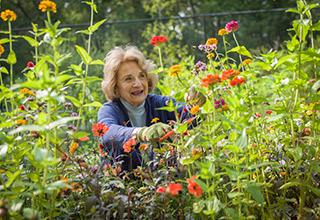How to Collect Your Family’s Stories
The stories of your loved ones are your own stories too.

Our parents, grandparents, and everyone who came before us have great stories to tell. Those stories shaped your cultural history and the personal, social, economic, or cultural factors that mold perspective and identity.
Your loved one might not think they are very important if they don’t have a direct connection to major historical events. They might say things like “I just lived a normal life and did my job like everybody else.” Accordingly, they might be hesitant to agree to record their stories. However, the simple fact that they lived through the past means their stories matter.
Time changes things, which means that commonplace occurrences, or ways people lived every day, might be very unfamiliar to younger generations. After all, your loved one lived before the current round of life-changing technologies like the internet and smartphones.
While it may feel awkward at first to “formally” make a record of your relative’s stories with a voice recorder, it’s a great way to preserve your family history. It’s important to preserve these stories in a more permanent way, as diseases such as dementia, and other age-related concerns mean that our loved ones won’t always be able to tell these stories.
Why you should collect the stories of your loved ones
Collecting family stories is about learning where you came from so you can have an idea of how you got to where you are. The way we relate to our family stories and create our own narratives about ourselves helps establish our unique, authentic core identity.
It’s also a great way to communicate across generations and encourage bonding between grandparents and grandchildren. Sharing stories can help put a real person behind the things that young people read in history books and learn in school. It can also help your children get to know their grandparent as a child, a worker, a young parent, or a friend, beyond just the “Nana” or “Grandpop” they know today.
Talking with your loved one about their history helps you to understand the struggles they overcame and builds empathy. That compassion can easily translate to our relationships with other people and even the way we interact with the world around us. We all face hard things. Remembering that fact in the context of others’ shortcomings allows us to be better spouses, parents, children, siblings, employees, managers, and human beings.
Furthermore, collecting stories about good times and bad times remind us that not everything in life will work easily, that disappointments occur and inequalities exist, but that we can recover, triumph, and find happiness through hardships.
Interview tips for collecting family stories and genealogies
So, you’re ready to start recording your family history. Where should you start? And how can you set yourself and your family member up for a successful conversation? Here are some tips:
- Listen carefully without interrupting.
- If your relative uses jargon, slang, or acronyms, ask for explanations. A commonly known organization — for example, the FBI — might change its name so future family members reading your story might not understand.
- Ask only one question at a time. This helps your family member stay on topic and makes it easier to ask clarifying follow-ups.
- Ask about alternative sides of a situation. For example, if your relative has just described the joys of their childhood home, you may ask for a description of the family’s challenges during a particular era, and vice versa.
- Allow your relative to tell their version of events. You might already be familiar with some of the things they are saying, but try not to challenge their story.
- Give your relative space to reminisce and ramble, as unexpected details might emerge. Give them time to come to the point while listening carefully for cues for later questions.
- Physical descriptions of people or places can help make a story more vivid. Ask your relative to describe the people they mention. That might trigger other recollections.
- Reword or rephrase questions that your loved one did not answer – they may not have heard what you thought you asked.
- Most people have a favorite story. They will fit it in somehow, so let it happen! Allow some repetition since additional details may emerge with a second version, but try to avoid letting them tell the same story over and over.
- Keep in mind the length of time you’ve been talking. It’s alright if you don’t get the full story the first time. Schedule another time to talk if your loved one is feeling tired or starting to be less clear. You might want to aim for a conversation of around an hour or two, or break it into even shorter sessions for an older person who is frailer.
Family history interview questions
While some people are natural talkers and will open up easily, others might need prompting and encouragement. Coming prepared with some questions, and techniques to keep the conversation flowing, will help you get more out of the session.
- Rely on open-ended questions that require more than a one-word answer, such as: Tell me about your high school experience. How did you celebrate Christmas? What were your grandparents like? Describe your first home.
- Use neutral, not leading, questions or statements: "Tell me about living here" rather than "Why don't you like living here?"
- Questions that start with how, what, when, why, where, and who can introduce a new subject or follow up on an initial statement. Examples: How did you first learn that the Acme School would be closed? Tell me more about that.
- Remember to ask about their opinion and feelings: Why do you think everything happened the way it did? And what did that mean to you/how did it make you feel? Looking back, do you think this had a big impact?
- To stimulate their memory, use “statement questions” such as, “In 1956, you went on a trip overseas. How did that trip come about?”
Encouraging your loved one to open up
If you’re having trouble getting past surface answers, or want to dive deeper into a particular area, ask follow-up questions to draw out details and clarify information. Sometimes people might worry that they are rambling so follow-ups help put them at ease to continue.
Here are a few ways to probe for more information:
- Take your time. Pausing before asking a follow-up question gives your relative additional time to ponder the topic or the last question. It can help slow the pace of the discussion and put them at ease to take their time asking questions.
- Express interest in what they’re saying. Add things like: “I see, really?” and “Is that so!”. Gestures, such as a head nod, a smile, or an open hand may also be effective here as encouragement.
- Ask immediate follow-ups. “Tell me more about ...,” “Please elaborate on that ...,” “What else happened ...?” Express curiosity and keep the conversation going with probing questions involving “who, what, where”.
- Go back for clarification. Revisit information given earlier and ask for more details of a situation.
- Jog your relative’s memory. If possible, bring visuals such as newspaper clippings to stimulate memory, or ask to bring out photo albums of trips or family events.
- Probe for details. Rephrase questions until your loved one shows signs that their memory has been depleted on a given topic. Ask for multiple examples of something.
Setting up the right environment
Setting up the right time and place for the conversation is important. You want to minimize distractions so your loved one is able to reflect widely, recall fully, associate freely, and maintain an atmosphere in which they are willing to articulate fully those recollections.
- Choose a time when your loved one will be alert and relaxed.
- Find a good place where you won’t be interrupted.
- Have a snack and water available to keep things on track, rather than figuring out what kind of tea you would like mid-conversation.
A note on transcribing
In addition to making an audio recording, you may want to consider taking the additional step of transcribing the conversation. A written record can be easier to access, comprehend, and preserve for the future if technologies change. There are free tools on the internet that can create a transcription for you, which makes the process much easier.
Here are a couple of things to keep in mind when you are recording.
- Jot down proper names or place names your loved one mentions so you can ask for correct spellings at the end of the interview.
- State the biographical information of the person you are talking with at the beginning of the recording.
Honoring older generations
Part of collecting family stories is about honoring the individuality of older adults, respecting their life experiences, and supporting the contributions they are still making. That’s exactly the approach we take at Hebrew SeniorLife. The people we care for, and the history they carry with them, are at the heart of what we do. Across our continuum of services, we focus on what matters most to each person in our care by listening to their stories and understanding the experiences that made them who they are.
You can learn more about our person-centered health care on our website. If you’re looking for new neighbors to share your stories with, check out our continuing care retirement communities in the Boston area: NewBridge on the Charles in Dedham, MA and Orchard Cove in Canton, MA. Contact us today to explore all the options.
Blog Topics
Learn More
The Best Health Care for Seniors
Hebrew SeniorLife is the only senior health care organization affiliated with Harvard Medical School. Members of our caregiving teams specialize in providing geriatric care, and they do so with care and compassion.

Luxurious, Intergenerational Living
At NewBridge on the Charles in Dedham, MA, you'll find modern senior living on a 162-acre intergenerational campus. We offer a complete continuum of care to support your best life, as you define it.

A Community for Residents, By Residents
Orchard Cove, in Canton, MA, offers living options that span the full continuum of care, including independent living. The community is bustling with activities, from life-long learning to entertainment.




